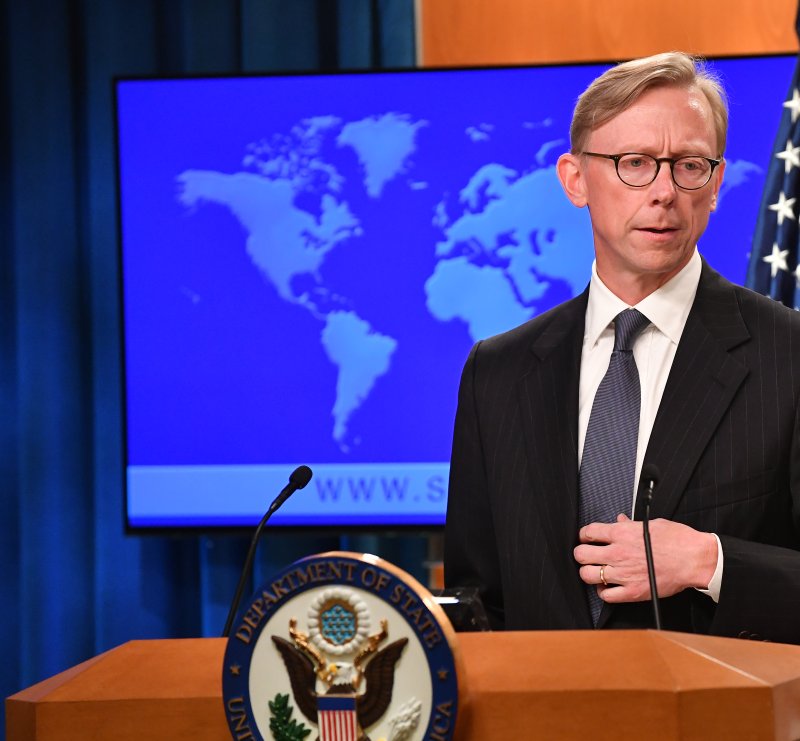Brian Hook speaks at the announcement of the creation of the Iran Action Group at the State Department on Thursday. Photo by Michael Gross/U.S. State Department
Aug. 20 (UPI) -- Mike Pompeo, the U.S. secretary of state, has announced the appointment of Brian Hook as
the U.S. State Department's special representative for Iran and tasked him with the creation of
an Iran Action Group to monitor Iran's compliance or non-compliance with Pompeo's 12-point plan for change of behavior of the Iranian regime.
Hook was formerly an aide to national security adviser John Bolton, when Bolton was U.S. ambassador at the United Nations and both of them are known to take a hard line on Iran. Bolton has been a longstanding advocate of regime change, while Hook has been brought in to further
Pompeo's policy of change of behavior.
Washington pundits now suggest that the two diverse approaches are incompatible, but they
are missing the subtlety of Pompeo's strategy. Pompeo knows that for Iran, compliance with
his 12-point plan is impossible. After announcing America's withdrawal from President Barack
Obama's flawed nuclear deal and his catastrophic policy of appeasement to the mullahs,
Trump set the bar for reform deliberately high.
Pompeo said recently: "The regime in Tehran has been responsible for a torrent of violent and destabilizing behavior against the United States, our allies, our partners and indeed the Iranian people themselves."
The 12-point plan includes an end to the clerical regime's clandestine efforts to build a
nuclear bomb, an end to their ballistic missile program, their complete withdrawal from
proxy wars in Syria, Iraq, Yemen and Lebanon, an end to cyberattacks, an end to their
involvement in international terrorism, an end to threats against Israel and an end to the
human rights abuse that takes place on a daily basis inside Iran.
Ayatollah Khamenei, Iran's supreme leader, and his fascist clerical state will never stomach such a climbdown. Rather than getting involved in a military overthrow of the regime, the USA wants to use
sanctions to squeeze the mullahs until the pips squeak. Pompeo is convinced that new
sanctions will cripple the regime. On Aug. 4, American sanctions on the trade in gold,
metals and food to Iran came into effect. At the beginning of November, the American siege
on Iran's main source of revenue begins, when Pompeo has urged all countries to reduce their
imports of Iranian oil as close to zero as possible.
To those mostly EU companies who have long put lucrative commercial deals with Iran
ahead of human rights, Trump has warned that anyone who does business with Iran won't do
business with America. Trump's warning has led to Germany's state-owned rail operator Deutsche Bahn announcing that it is phasing out projects in Iran.
Several other European companies have suspended plans to invest in Iran due to the U.S. sanctions, including the French oil giant Total, as well as carmakers PSA, Renault and
Daimler.
In a desperate bid to fill the economic void, Iran's mullahs have reopened demands for
reparations from neighboring Iraq, for damage they say they incurred during the 1980-88
Iran-Iraq war. This has caused huge anger and resentment in Iraq, where widespread poverty
and deprivation is still the norm in a country that has suffered massive devastation, largely at
the hands of Iranian-backed militias, as well as the Islamic State.
In sharp contrast with the Obama administration, Trump's policy is now to support the 80
million citizens of Iran who are sick to death of the regime's brutality and corruption and are
demanding regime change. Their daily protests, which have raged across Iran since last
December, are increasing in fury and intensity. The chants of the protesters have shown that
this is an uprising against the Islamic Republic itself. Despite the deadly crackdown by the
mullahs' security forces, it has become abundantly clear that the clerical regime is on its last
legs and its demise is inevitable.
The mullahs have blamed the main democratic opposition movement -- the People's
Mojahedin of Iran (PMOI or MEK) and the NCRI led by Maryam Rajavi -- for fomenting the
unrest in Iran. After years of dismissing the PMOI as an insignificant irritant, they are now
terrified of Rajavi and her pledge to restore peace, freedom and democracy to Iran's
beleaguered citizens.
Washington's new special representative for Iran -- Hook -- has a big job on his hands.
Will he be the hook that lands the biggest fish of all and rids the world of one of its most evil
dictatorships?
Struan Stevenson is coordinator of Campaign for Iran Change, served as a member of the European Parliament representing Scotland (1999-2014), president of the Parliament's Delegation for Relations with Iraq (2009-14) and chairman of Friends of a Free Iran Intergroup (2004-14). He is an international lecturer on the Middle East and is also president of the European Iraqi Freedom Association.















